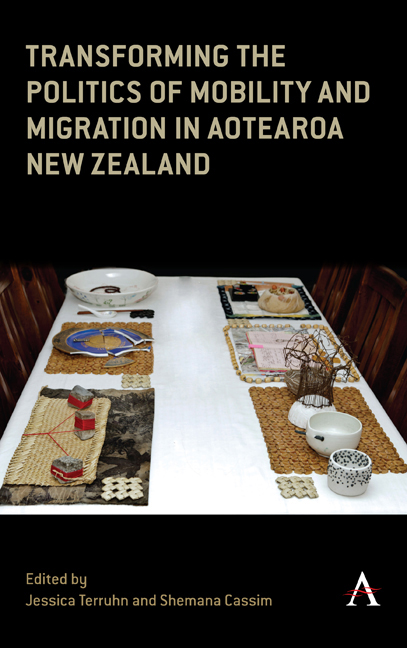Book contents
- Frontmatter
- Contents
- Acknowledgements
- Contributors
- Glossary of Te Reo Māori Words
- Glossary of Te Reo Māori Place Names
- Glossary of Other Non-English Words
- List of Tables
- List of Figures
- Introduction: Reimagining the Politics of Mobility and Migration Through Decolonisation, Social Justice and Solidarities
- Cover Artwork: A Place at the Kauri Table Revisited … 2021
- Part One Decolonising the Politics of Migration
- Part Two Humanising the Politics of Transnational Mobility
- Part Three Building Solidarities for Migrant Rights and Belonging
- Conclusion: Towards Transforming the Politics of Mobility and Migration in Aotearoa New Zealand
- Index
Six - Migrants for all Seasons? Impacts of Border Closures on Recognised Seasonal Employers and Pacific Workers in New Zealand
Published online by Cambridge University Press: 28 February 2024
- Frontmatter
- Contents
- Acknowledgements
- Contributors
- Glossary of Te Reo Māori Words
- Glossary of Te Reo Māori Place Names
- Glossary of Other Non-English Words
- List of Tables
- List of Figures
- Introduction: Reimagining the Politics of Mobility and Migration Through Decolonisation, Social Justice and Solidarities
- Cover Artwork: A Place at the Kauri Table Revisited … 2021
- Part One Decolonising the Politics of Migration
- Part Two Humanising the Politics of Transnational Mobility
- Part Three Building Solidarities for Migrant Rights and Belonging
- Conclusion: Towards Transforming the Politics of Mobility and Migration in Aotearoa New Zealand
- Index
Summary
Introduction
On 19 March 2020, the New Zealand Government announced that the country's international border would be closed to entry of anyone who was not a New Zealand citizen or permanent resident. This unprecedented decision matched that of an increasing number of countries worldwide in an attempt to contain the spread of a new strain of severe acute respiratory coronavirus, now widely known as Covid-19.
At the time New Zealand's border closed, there were over 300,000 people on temporary study, work and visitor visas in the country and at least as many New Zealand citizens and permanent residents temporarily absent overseas. As borders closed and associated travel restrictions were implemented worldwide, international air travel reduced significantly. Getting home quickly became impossible for most of those temporarily in New Zealand or for New Zealanders wanting to return. Governments globally were scrambling to address the dual challenge of containing the virus while also addressing the plight of those whose visa status did not allow them to stay long term in (or return to) the countries where they were temporarily resident.
There is an extensive literature on the impacts of the Covid-19 pandemic on international migration. For migrant workers, of which there were an estimated 164 million in 2017 (ILO 2018), the Covid-19 pandemic presented challenges to health, livelihoods and mobility. In many countries, migrant workers make up a sizeable share of the workforce ‘on the front lines’, carrying out jobs in essential sectors including health and aged care, transport, construction and agriculture (ILO 2020). States’ measures to control transmission of Covid-19, in the form of border closures, quarantine and travel restrictions, disrupted transport networks and the ability of people to move. For some migrant workers, border closures meant they were unable to enter a destination country for work; for others, travel restrictions meant they were caught in the host country and unable to return home. This had significant implications for workers and their families who relied, to some extent, on incomes earned overseas and remittances to support livelihoods at home (World Bank 2020).
In common with other states worldwide, Pacific Island countries and those on the Pacific Rim, including Australia and New Zealand, responded to the pandemic by restricting entry of non-citizens and implementing requirements to spend time in Managed Isolation and Quarantine (MIQ) facilities for persons permitted to enter the country.
- Type
- Chapter
- Information
- Publisher: Anthem PressPrint publication year: 2023

